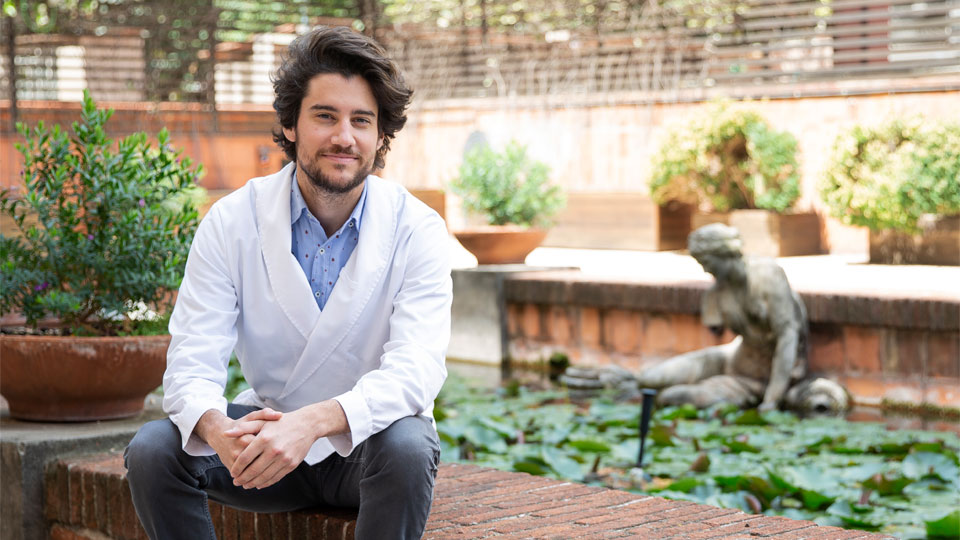Refraction or prescription
31/03/2025

26/05/2023
Fifth generation of the Barraquer family, son of Professor Barraquer and the person in charge of ensuring that the legacy of the clinic continues to live on. Bachelor of Medicine from the International University of Catalonia (2016). Subsequently, he specialized in Ophthalmology at the KBC University Hospital in Zagreb (2023). He recently joined the Barraquer Ophthalmology Centre team.
Did the last name Barraquer influence you to study Medicine and to specialize in Ophthalmology?
It is not possible to have such a great legacy and avoid the influences that this entails. Ophthalmology has always been an integral part of our household, and therefore, it is to be expected that part of it must have instilled in me the desire and enthusiasm for such a beautiful career. On the other hand, I would be lying if I said that after that seed had been planted it would not grow independently over time into a very revealing and rewarding experience. After all these years of training, I understand why doctors are said to have a "vocational" tendency: once in, you don't want to come out.
How were your beginnings, what do you remember from your time as a resident?
As a resident, I carry with me the friendships that accompanied me along the way: my co-residents. Many hours are spent in a hospital, and the brotherhood that is formed transcends time and space; they always stay with you. The first shifts are a true acid test, in which you discover not only what you know and how to apply it, but also how well a team can work regardless of the time or place. Above all, you experience the gratitude of the patient. They know that you have slept little and that you share their concern for something as fundamental as their vision. And when they go home with a solution, you understand why all that effort is worthwhile
What has led you to specialize in the areas of cornea, ocular surface and refractive surgery?
They say that there is no better teacher than your father and, in my case, I am lucky that he is a Professor in the literal sense of the word, and no less than in ophthalmology! I believe that in regards to my medical career as an ophthalmologist, starting a subspecialisation in cornea, ocular surface and refractive surgery is the first logical step given the circumstances, but I do not rule out delving into other subspecialties.
Your grandfather is a figure very loved by patients, how do you remember him?
Grandpa always had a gift with his hands and words, he inspired and brought a smile to everyone around him, not just the patients, but his entire team. I hope I can add my own touch by combining what the three most important figures in this regard have given me, the trifecta that has taught me everything I know: my grandfather, my father and my mother.
How is your day? What do you like most about your profession?
Every day is different, each patient a world. I like that our profession allows us to connect with the patient in the consultation and, jointly, to be able to solve problems that transcend drugs and eye drops, using our hands in the operating room. This ambivalent aspect refreshes the work experience for us and gives us multiple tools to offer our patients, something that happens in few specialties.
How do you see the future of the Centre 10 years from now?
My vision of the future for Barraquer is one of tradition and innovation. Professor Ignacio Barraquer, founder of the clinic, always tried to innovate in every field he touched, from architecture to ophthalmology. His legacy is still lived in the corridors of Barraquer. Regarding ophthalmology and facing the daily clinical practice of the time, he was inspired, in part, by great minds of European ophthalmology of the time and devised a multitude of techniques and instruments that are still used today or, failing that, versions improved on them. That is my vision, to innovate by generating ideas, bringing them to life or trying, and hopefully inspire a whole generation of ophthalmologists to do the same and perhaps even better.
With such an absorbing job, what do you do to unwind?
It's highly likely that if it weren't for my girlfriend and my good friends, I would be completely consumed by this fascinating work. I am deeply grateful to them for reminding me that there is life beyond ophthalmology because sometimes we forget. Paradoxically, I find that this concept is a fundamental part of our work, as good ideas don't always come from the same place.